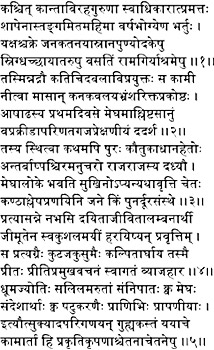 Meghaduta (literally meaning "cloud messenger") is a lyric poem written by Kalidasa, considered to be one of the greatest Sanskrit poets in India. A short poem of only 111 stanzas, it is one of Kalidasa`s most illustrious works.
Meghaduta (literally meaning "cloud messenger") is a lyric poem written by Kalidasa, considered to be one of the greatest Sanskrit poets in India. A short poem of only 111 stanzas, it is one of Kalidasa`s most illustrious works.
Meghaduta is separated into two parts - Purvamegha (Previous cloud) and Uttaramegha (Consequent cloud). According to the story, Kubera, treasurer to the Gods, possesses a band of celestial attendees working for him, named the Yakshas. One of these Yakshas was so besotted and preoccupied with his wife that he absolutely disregarded his duties. As a consequence, he was cursed and banished into the thickness of earthly woods. Wholly demoralised, he kept thinking about his wife and felt her absence terribly. His wife also kept reminiscing about him all day and all night.
Then one day, monsoons started to splash upon earth. The Yaksha saw a rain cloud pass by and requested it to carry a message to his wife, then languishing on Mount Kailash in the Himalayas. The Yaksha then commences to describe the route the cloud should be taking in the northward direction. The description is so enamouring and so pictorial, that one can actually experience the scenes are flashing in front of the eyes in a vision. The Yaksha makes the route seem as bewitching as possible, so that the cloud takes his message to his wife, in the city of Alaka (according to Hindu mythology, Alaka sometimes also referred to as Alakapuri, is a mythical city in the Himalayas.).
The emotions portrayed by Kalidasa in his lyric poem Meghaduta are extremely exquisite, giving rise to the poem first being translated into English by Horace Hayman Wilson in 1813.
This article is a stub. You can enrich by adding more information to it. Send your Write Up to content@indianetzone.com













